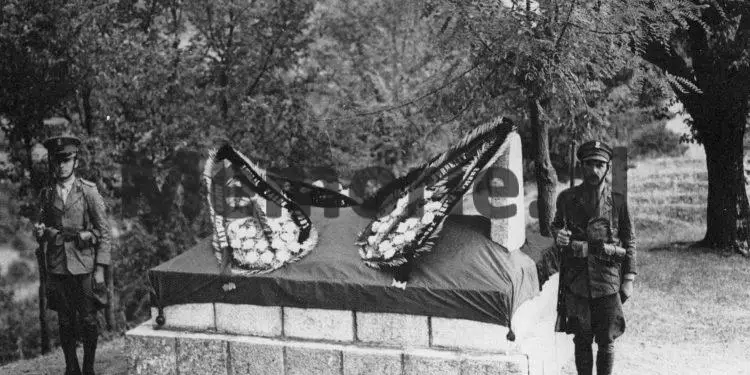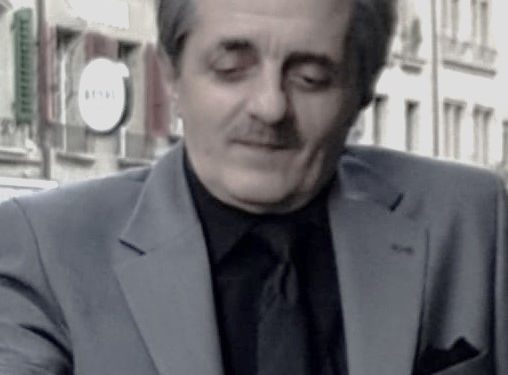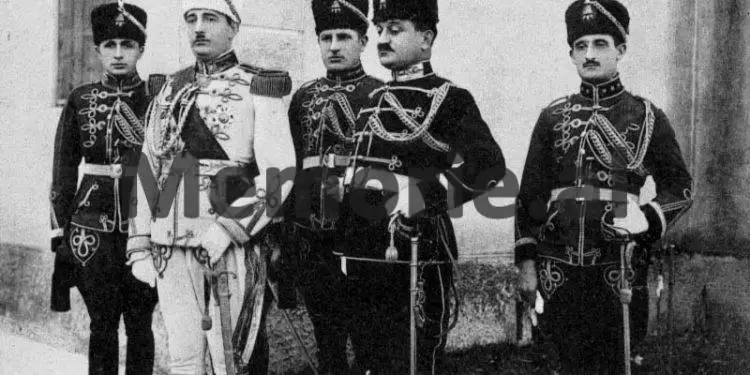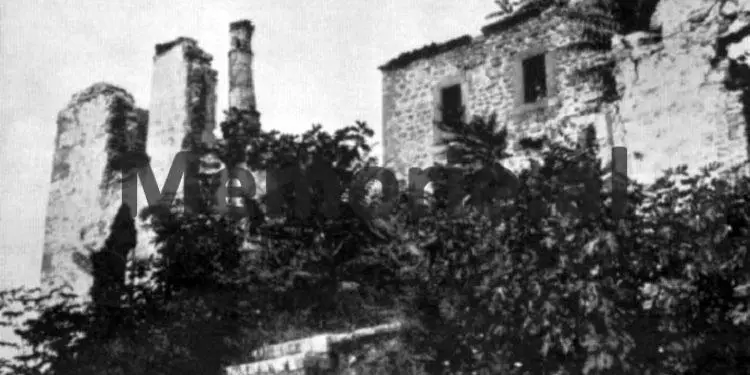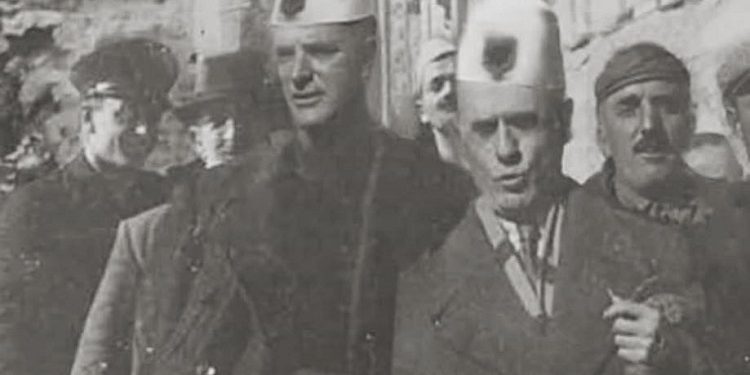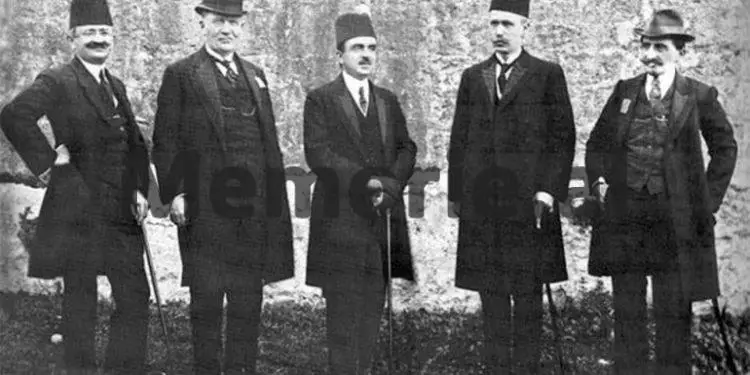By Eugen SHEHU
Part One
Memorie.al / It is almost like saying an axiom, the expressed opinion that history is the awake memory of a people! It never sleeps. It cannot sleep, otherwise it would be the death of the nation. This does not mean at all that there cannot be people who seek to kill history. On the contrary, they are in abundance and this was especially proven by the half-century-old Albanian dictatorship which not only falsified and denigrated a relatively long period of the history of this century but, especially, tried to kill it. What weighs heavily in Albania, but also in Kosovo, Montenegro and Albanian Macedonia, was called the “Zog Period”, which was dressed up by communist historiography, in all its blackness, as suited Slavic-Orthodox, Greek-Serbian-Bulgarian and Italian expansionism.
Every time a bridge has been built in Albania with voluntary contributions, it has been said that the former King has not even remembered him, and every time there has been talking about socialist “welfare”, it has been said that during Zog’s time, there was a shortage of food! While it has been said that; King Zog himself ordered the opening of two prisons! The irony of fate is that while the Albanian state in the 1930s had opened two prisons (a consolidated state cannot be understood without its prisons), the Albanian communist dictators had built dozens of such. In fact, in terms of the restriction of basic rights and the violence practiced there, these prisons were comparable only to Stalin’s gulags!
The people listened but rarely believed. They were too naive tales for the entire population to believe (with the exception of those infected with the communist virus), and swallow them. But anyway, the people could not speak. The word (which according to the Quran and the Bible, is the first), had a very high price in the dictatorship. If you praised the government, if you said things openly, it would “help” you descend into the hell of communist prisons. This was how it was, both on that side of the artificial border with barbed wire, within the Albanian state, the common language; Enver-Tito, Mehmet-Ranković, was sharp and murderous, until it uprooted the votaries and wiped out the loyal nationalist Albanian families.
However, if even now, in everyday conversations the phrase; “just as it was in the time of Zog”, this means, among other things, that on the face of that time, the life, works, dedication and even the death of King Zog are engraved. A strange cohesion was able to keep the brave and patriot of Mati together, during those years full of fortitude that our homeland went through, in the 1920s-1940s, of the last century.
It was the evening of October 8, 1895, when the house of Xhemal Pasha Zogu was filled with friends. The large towers there in the village of Burgajet in Mati were filled with joy and lively conversations, which had long since become nurseries of patriotic thought. Among the friends, the gentle voice of Dervish Hima was especially heard, who, pursued by the authorities of the Sublime Porte, had gone to Albania with the great mission of awakening national consciousness. The conversation took off and Xhemal Pasha Zogu announced to the friends of his towers in Burgajet that they would always be outposts of the Albanian struggle for the independence of their lands.
The men’s emotional conversation and the oath on the table, but suddenly the crack of rifles and the knock on the door of the room where the men give their oath to the homeland, suddenly announce with a joyful voice to Xhemal Pasha, that the Great God had given him a son. It was so necessary that the men stood up from the table and grabbed the master of the house by the throat, congratulating him according to Albanian tradition and custom. On the other hand, Xhemal Pasha, very emotional and crying with joy, prays to Dervish Hima, to let him be the godfather of the newborn son. Then the joy culminates and the great patriot Dervish Hima, baptizes the newborn son, with the name Ahmet. In this environment inspired by wars and brave and patriotic Kaçaks, Ahmeti, the only son of Xhemal Pasha, was born.
History would reserve for him a fate almost similar to that of his predecessors, whose rifles had always fired for the freedom of ethnic Albanian lands. Among the first scholars of the Albanian royal family, Kristo Dako, wrote: “In 1852, Xhelal Bey participated in the war against Karadak, as commander of a force of 1500 people, most of whom were from the Zogoll tribe. In this war, Xhemal Bey showed great bravery and was wounded in the attack. The Matjans, seeing the wound he received, said to him; ‘Come back, I saw you killed’! and he replied: ‘Mat’s husband is not coming back, it is our honor and we are begging to take Cetinje’! And so, with his attitude and bravery, he won the war, and the song that is sung even today came out; ‘Who overcame the mountain? Xhemal Bey with Matjane”! (Kristo Dako “Historical notes from the life and works of the King of the Albanians” – Tirana 1937, page 21).
Xhemal Pasha (Ahmeti’s grandfather), in the 1980s, would be in close friendship with Seid Bey Toptan, Naum Veqilharxhi and Hoxha Tahsini. On their initiative, they wrote a memorandum for Sultan Aziz, reminding the latter that schools should be allowed to open in the four vilayets of Albania, as the time required such a thing. Ismail Qemali, who at that time directed the newspaper “Zaman”, would also often go to Istanbul, to the great palaces of Xhemal Zog. The conversations between him and Xhemal Pasha would last quite a long time and in addition to concerns for Albania, the ways would also be found to throw off the long Ottoman night.
Xhemal Zogu left behind four children: Rizai, Hedija, Zijai and Xhelal (Ahmeti’s father). Xhelal, while continuing his schooling in Istanbul, interrupted it at the age of 16, as he had to go to Mat, on the duty of Kajmekam. He linked his life definitively with Mat, showing in addition to his patriotic values, the brave gene of this tribe which, although it could live among the good in Istanbul, always trembled in the sacred cradle of love for the land of its ancestors. Xhelal Pasha’s towers in Burgajet, gradually, became the hearth of organizing great movements for education and national independence, not only in Mat but also further, in all the regions of Dibra and beyond.
Vehbi Dibra, Dervish Hima and dozens of other patriots had spent weeks in the high towers of the Zogolls, feeling closely not only the generosity but especially the Albanianism that grew within those walls. In these environments, with these people, of course, Ahmeti’s life would take on other meanings. That life could not be dragged out to the fiery towers or the fashionable salons, but that life was destined to be lived in the storms. In 1908, Xhemal Pasha Zogu died unexpectedly. Ahmeti was 13 years old and of course he fainted. But they show that Mother Sadija did not like the sadness and cared for her son with love, but also with an almost manly nobility. Unable to be educated in Albania, she took her son to Istanbul, with the message, as befits a noblewoman, firm and significant; “Mati expects from you. I must follow in the footsteps of my grandfather and father”!
In Istanbul, Ahmet Zogu studies at one of the military academies, which at that time were almost a necessity for the sons of great men. Also inclined towards military art, Ahmet Zogu was very attentive and quite demanding of himself. Naturally, there he met many other Albanians and became aware of the events that had engulfed his country. In the summer of 1912, he came to Albania and as soon as he went to Burgajet, he became acquainted with the concrete circumstances in which our national movement was struggling. He was very young, only 17 years old when, at the head of a handful of brave men from Matjan, he set off for heroic Vlora in November 1912.
“However, due to the very difficult time of that autumn and the dangerous journey, being guarded by the ambushes of the Serbo-Turkish army, he arrived late. When he arrived in Vlora, everyone was happy, but they were also surprised to know that in addition to the bad weather, he had gone through many dangers along the way. Ismail Qemali hugged him, kissed him on the forehead and said: Welcome, my son, because for this work that we are doing here today for the good of Albania, we had your grandfather Xhemal Pasha Zogu as a teacher.” (Abedin Mulosmanaj, “The Leader of Our National History”, “Dardania”, page 63).
Archival sources speak of the fact that the 17-year-old boy from Mati, was acquainted in the following days with the historical decisions of the national assembly of Vlora. However, it was also the desire of the patriotic patriots, that one of the premises of the famous house of Xhemal Bey, to say some words of greeting which aroused admiration in the ranks of the patriots of that time. Thus, in mid-December 1912, Ahmet Zogu leaves Vlora with the promise made to the men of the assembly that in front of any Serbian military force in Mat, they would see the barrels of the weapons of the brave Matians.
Meanwhile, the events that followed are more or less known, the Balkan monarchies rushed like hyenas to tear apart the body of their ancient neighbor. The Greeks in the south burned entire villages, killed women and men, demolished mosques and burned tekkes. The Serbs did not fail to bathe all of Kosovo and Dibra in blood, so much so that the Black Drin turned red. The Montenegrins came as far as the city of Shkodra, demanding its surrender. Faced with this difficult situation, the Albanian government raised its voice loudly, demanding from the Great Powers the guarantee of freedom and borders, from the greed of its neighbors. On July 29, 1913, the Conference of Ambassadors decided that Albania should be placed under the control of the Great Powers.
For this purpose, it appointed an international commission with representatives of the six Great Powers and one representative from Albania. At the same time, it was decided that a foreign prince would be placed at the head of the Albanian state, while the leadership of the gendarmerie would be entrusted to Dutch officers. Faced with these powerful currents, dictated by Europe but especially by events in the country, Ahmet Zogu would always be prudent and cautious. He knew how to realistically assess political or military forces, and most of all he knew how to take his own position in everything that happened in Albania in those years. At the beginning of 1914, the influence of Esat Pasha in the districts of Central Albania was already known.
Because he wanted to have personal relations with neighboring countries, and wanting to turn Albania into their fiefdom, he put Haxhi Qamili at the head of this movement, who paradoxically has been interpreted by the miserable historiography of communist Tirana as a “prominent popular leader”. However, the reality is that Haxhi Qamili and his forces aimed to overthrow Prince Vid, in order to bring a Turkish pasha to Albania. So compromised was this movement that on September 1, 1914, after some fierce fighting, Haxhi Qamili’s forces entered Vlora and where the elder Ismail Qemali had raised our national flag two years earlier, they placed the Turkish flag. At these moments, Prince Vidi asked for the help of Albanian patriots from all sides.
But only a few leaders of the Northern patriotic movement responded to this call. Among them, the greatest role was played by Ahmet Zogu, who, although he fought from time to time against the Serbs, in Mat, gathered about 300 forces and made himself available to the princely military negotiations. Perhaps it should be said that, despite the great influence of his parents and school, Ahmet Zogu had understood that the star of the Ottoman Empire had long since set. By aligning himself with the progressive forces, aiming at national awareness, Ahmet Zogu proved that his ideas were to bring Albania closer to the West as soon as possible, moving away from the East even at the great price of blood.
In the years 1915-1916, Ahmet Zogu stayed with his forces in Mat. The Burgajeti towers never lost their generosity. There were always friends in their rooms and the Queen Mother was happy to see the men of Albania come and talk to her 20-year-old son. Ahmet Zogu during this period, which coincided with the strong pressure of the Austro-Hungarian Empire, tried to organize the combat formations he commanded as well as possible. With a subtle military intuition, he tried to create quite versatile combat units, with clear tactical ideas and above all with the determination to sacrifice his life for the homeland.
In March 1916, Ahmet Zogu took the initiative to call a national assembly. The violent policies of the First World War required unity among the Albanian nobility, because the homeland was endangered by the daily erosion of borders. To carry out this assembly as effectively as possible, Ahmet Zogu undertakes another trip to Vienna, seeking the support of Austria-Hungary. For the high authorities there, foreseeing a violation of their interests, not only do not extend him a hand of cooperation but also keep him isolated for some time, under the pretext of some banal justifications. Even here, when he goes for the second time, the future King of Albania, miraculously escapes an assassination plot orchestrated by Albania from reactionary and feudal circles.
While at the end of the First World War, Ahmet Zogu returns to Mat. The idea of a national assembly is not only not tempting but, on the contrary, has already been discussed with other Albanian patriots. After missing his mother, Ahmet moves throughout Mat and up to the borders with Dibra, reorganizing the forces that would support this assembly of national unity. It should be noted that, by the end of 1919, the Italian government exercised complete power over the Albanian government apparatus in Durrës. Italian advisors were stationed near the prefectures and various institutions, dictating every possible development.
A deep connoisseur of Albanian wounds, Mid’hat Frashëri characterized this influence in a few lines, when he said: “The Italians who occupied Vlora and the southern regions, since 1915, did not behave badly individually, but their policy was not such as to inspire great confidence in the Albanians, because they sought to be masters of the house and to open Italian schools, where Albanian was only the second language”. (Mid’hat Frashëri, “Sources of the Italian-Albanian Conflict 1912-1920”, Published in “Mercyre de France”, on 1-VII-1920).
Thus, the Albanian patriots felt the need to organize a national assembly. Lushnja was designated as the place for its organization and the patriotic districts took measures to secure it. The organizing committee of the Congress of Lushnja invited all Albanian provinces to send their representatives to this historic assembly, on which occasion Ahmet Zogu was elected from Mati. At the head of two hundred men from Mati, he set off for Lushnja, a few days before the assembly was to convene. Without entering into discussions about what the Congress of Lushnja achieved, I can say that pure Albanianism won there.
With its decisions, this assembly put an end to foreign domination in Albania (especially the Italian one) and worthily maintained the independence of the homeland. At the same time, this Congress elected the new government headed by Sulejman Delvinës-President, Eshref Frashëri-Vice-President, Mehmet Konica-Minister of Foreign Affairs, Ahmet Zogu-Minister of Internal Affairs, Sotir Peci-Minister of Education, Hoxhë Kadriu-Minister of Justice and Ndoc Çoba-Minister of Finance”. (Central State Archive, Lushnja Congress Fund, File 7, sheet 23).
Very young in age, 25 years old, Ahmet Zogu took on a very heavy burden. It is worth noting that Albania in 1920, in addition to economic and political chaos, was also full of crimes and criminals of all kinds. Paid by Serbs, Greeks, Italians, Montenegrins or Bulgarians, the Albanian murderous hand shot at his blood brother, as if the tragedies were not over for this country. The Albanian Canon in on the other hand, he continued to be present in the Albanian towers, in the truest sense of the word, for a calm that could not even be discussed. But Ahmet Zogu was not afraid of his burden.
A few words, very few, he spoke before the congressmen, declaring his bravery and honesty before them, and before the echo of this oath had yet to die down, the son of Mati found himself at the forefront of the first storms. It is known that the Italian forces in collaboration with the internal reaction, would leave no stone unturned to sabotage the historic decisions of Lushnja. In conversation with Sulejman Delvina, Ahmet Zogu takes on the heavy burden of paving the way for the new government, to Tirana, the newly named capital. He takes only 30 well-armed Matjans and at their head, mounted on horses, they take the road to Tirana. Regarding this courageous journey, I am referring to the historical document “10 Years of the Kingdom”, which, among other things, states:
“As we approached Kavaja, our leader found himself in front of a foreign power that blocked his path. The commander of this force presented the Minister of Internal Affairs of Albania with the order to surrender, otherwise he would have been forced to use force. Zog’s response that I have quoted: ‘I have been ordered by the Congress of Lushnja, which has elected me Minister of Internal Affairs of Albania, to arrive in Tirana without fail. I am a soldier and therefore, alive or dead, I must fulfill the duty entrusted to me. You, if you wish, shoot me in the chest first.’ A deep silence remained in the middle of that cold conversation, like a mortar hanging over the two interlocutors. The foreign commander understood that the weapons fired to hit the Minister were a crime that would taint the state he represented. And he cleared the way.” (“10 Years of the Kingdom, page 28, Central State Archive).
Even at the Shijak bridge, the same scene would be repeated. But now the enemy weapons were loaded and only the order to empty them into the Matjane chests was awaited. Ahmet Zogu, after dismounting from his horse, gave orders to his comrades to get ready to fight and crossed the bridge alone to the senior Italian military officer. The latter, almost amazed by the brave gesture, stood still and at the moment he had to reply, extended his hand, saying; “you deserve to cross without a fight”! Many years later, regarding what the Lushnja Congress represented, Ahmet Zogu would say; “This was a magnificent initiative taken solely and entirely by the Albanian people, without any foreign help. This Congress will remain as the most magnificent event in the new Albanian history. Albania, thus is and will be independent, as its participation in the League of Nations proves”. (Speech delivered on 14 August 1935, Fund 147, file 8, page 3).
Meanwhile, on the shoulders of the future Albanian King fell the great task of ensuring peace, order, and coping, especially with the extremely dramatic situations in the North, in which case the Serbo-Montenegrin formations were constantly attacking the Albanian borders resulting from the London decision of 1913. But we must not forget for a moment that the Italian greed, to completely take over the Adriatic Sea, was not few. In fact, they were alive every day in Rome and were fully supported by Albanians. I think that in the period 1920-1922, in the position of Minister of the Interior, the role of Ahmet Zog should be seen in terms of his continuous connections with the Albanian national problem. Reforms that he undertook in all the structures of the Ministry of Interior of that time, he always saw them in the light of the will and future of our nation.
Ahmet Zogu never bothered with the beliefs of his subordinates, on the contrary he wanted them to be opponents in thought with him but always, cadres with dignity, with deep national awareness, with horizon and in no way corrupt. Ahmet Zogu worked so rigorously and sincerely in this direction that the results did not fail to come. Coming from political, economic, psychological and religious chaos, Albania after the Congress of Lushnja, recognized for the first time the security of its borders and people. With his extraordinary intuition, the son of Mati, even though he did not have large forces at his disposal, knew how to use the honesty and dedication of these forces, finding himself at the forefront of every difficult situation.
Although in great financial difficulty, but having the other support of the cabinet of 1920, the structures of the Ministry of Interior, the sea and land border guards, the liaisons and especially the Albanian gendarmerie, the first beginnings of modern concepts for the state appear. Regarding the efforts and disposition of Ahmet Zog, in these two years of his stay in the post of Minister of Interior, in a very concise and clear way, it is written in the English Encyclopedia;
“He became Minister of the Interior (January-November 1920) and organized resistance against the Yugoslav invasions. He was commander-in-chief of the national powers, in the cabinet of the “Holy Union” (October-December 1921) and again distinguished himself against the Yugoslavs as Minister of the Interior in the cabinet of Xhafer Ypi (December 1921-December 1922). There he defeated a serious insurrectionary movement in March 1922 and disarmed the field marshals.” (“Encyclopedia Britannica”-volume 23, page 983, year 1969).
Since the time has come when things can and should undoubtedly be expressed as they happened, I think that today’s Albanian historiography should give the events of March 1922 the place they deserve. In summary, I say that these events that wanted to stabilize the state that emerged from the Congress of Lushnja could not have had any other impetus than those of the Serbs and Montenegrins. Although formations of Bashibozuks from Durrës and Shijaka flocked to Tirana, I cannot think that they knew the program of the Albanian government and because they did not like it, they wanted to overthrow the state with some Italian Mausers, but the point is that in many cases, the revolts of the Albanians against their state were prepared in the kitchens of Belgrade, Cetinje, Athens and Rome.
But even in these difficult moments for the Albanian state, Ahmet Zogu showed his calmness and prudence. Being at the head of the Albanian national forces, he led the actions against the Bashibozu forces, in several battles of Durrës and Shijak. By breaking through first, with weapons in hand, Ahmet Zogu was able not only to crush these regressive formations, but also to establish the iron hand of the state in all of Central Albania. This is the reason that a few days after his return to Tirana, by the highest authorities of the Albanian state, Ahmet Zogu was decorated with the medal “Savior of the Nation”. I even think that this, among others, was the reason that in December 1922, Ahmet Zogu was appointed Prime Minister of Albania. Memorie.al
To be continued in the next issue




